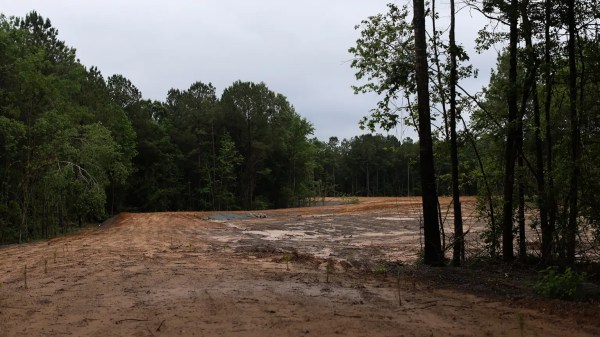A representative of Exxon, the only company that responded to a request for comment, said it has strived to build ties with communities throughout the region. тАЬWe connect early and often with elected officials, community members and local leaders to have meaningful conversations, provide transparency, and find ways to give back,тАЭ the representative said. It has opened a community liaison office in Magnolia and has worked with the cityтАЩs Chamber of Commerce to sponsor community events. It also established a $100,000 endowment for Columbia and Lafayette counties to provide grants for тАЬeducation, public safety, and quality-of-life initiatives.тАЭ
Folks in Lewisville would like to see more of that kind of attention. In March, the city, working with the University of Arkansas Hope-Texarkana, hosted a town hall meeting so residents could speak to lithium executives and express concerns. The mayor recalls it drawing a standing room-only crowd that expressed hope that the industry would bring jobs and revenue to town, but also worried about the environmental impact. Folks called on Exxon and other companies to support new housing and establish pathways for young people to work in the industry.┬а
Venesha Sasser, who at 29 is the chief development officer of the local telephone company, sees the coming boom providing an opportunity to build generational wealth for families and resources, like broadband internet access, for communities. Any company that can invest $4 billion in a lithium operation can surely afford to toss a little back, Sasser said. тАЬWe want to make sure that whoever is investing in our community, and who we are investing in, actually means our people good.тАЭ
Sasser followed a trajectory common among young Black professionals from the area: She left to pursue an education, then returned to care for loved ones. As she got more involved in the community, she often found herself being treated a little differently, an experience Mayor Dunbar delicately described as bumping up against тАЬold systems.тАЭ Lewisville is a majority-Black town in a majority-White county, and as of 2022, had a poverty rate of 23%. Although community leaders say they work well with colleagues in other towns and with county leaders, they also feel that theyтАЩve had to elbow their way into conversations with lithium companies. They worry that the dynamics of the oil days, when Black men worked alongside whites but often in lower-paying, less desirable jobs and most of the money stayed in wealthier cities like El Dorado, will repeat themselves.
тАЬYou had people from Magnolia and El Dorado and Spring Hill and other places coming in and doing the work and reaping the benefits, and then when it was gone, they were gone,тАЭ said Virginia Henry, a retired school teacher who grew up in Lewisville and lives in Little Rock. Her ex-husband drilled for oil years ago, and the experience left her with a sour taste in her mouth. тАЬIтАЩm thinking itтАЩs going to be pretty much the same,тАЭ she said. тАЬTheyтАЩre going to ease in, they want to do all this work and create all these jobs for somebody and then ease out when itтАЩs done in a few years. Then here weтАЩll be with soil that canтАЩt grow anything, contaminated water, and a whole bunch of kids with asthma.тАЭ
Mayor Dunbar, who is midway through his second term, is trying to balance reservations with optimism. тАЬтАШImagine the possibilities.тАЩ ThatтАЩs my tagline,тАЭ he said, settling into a chair at City Hall. A blackboard behind him outlined his priorities: housing, recreation, education. He hopes support from companies like Tetra Technologies, which is developing a 6,138-acre project not far away, will finance those goals and give people a future thatтАЩs more stable than the past, one in which LewisvilleтАЩs children can pursue the same opportunities that kids in nearby, better-resourced communities can.┬а
тАЬThink about Albemarle in Magnolia,тАЭ he said, referring to the bromine plant about 30 miles up the road. тАЬGet a job at Albemarle, you stay there 25 years, you earn a decent salary, youтАЩd have a decent retirement. You can live well. Quality of life is good. We are hoping to see the same thing here.тАЭ┬а
Many of the people poised to benefit from the lithium beneath their feet seem ambivalent about climate change. In El Dorado, in a bar called The Mink Eye, an oil refinery worker grimaced at the mention of electric vehicles. The next morning, retired oil workers gathered at Johnny BтАЩs Grill scoffed at the idea of a boom. A waitress admitted that sheтАЩd bought stock in lithium companies, but said any faith that the industry will bring renewed prosperity does not necessarily mean folks are on board with the green transition. тАЬThese men drive diesels,тАЭ she said, pointing toward her customers. Still, she said, any jobs are good jobs.
That attitude pervades the state capitol in Little Rock, where politicians who donтАЩt give much thought to why the energy transition is necessary cheer the stateтАЩs emerging role in it. The governor, who has cast doubt on human-caused climate change, has appeared at industry events like the Arkansas Lithium Innovation Summit to proclaim the state тАЬbullishтАЭ on its reserves of the element. тАЬWe all knew that towns like El Dorado and Smackover were built by oil and gas,тАЭ Sanders told the audience. тАЬBut who knew that our quiet brine and bromine industry had the potential to change the world.тАЭ
Much of the worldтАЩs lithium is blasted out of rocks or drawn from brine left to evaporate in vast pools, leaving behind toxic residue. The companies descending on Arkansas plan to use a more sustainable method called direct lithium extraction, or DLE. It seems to be a bit more ecologically friendly and much less water-intensive than the massive pit mines or vast evaporation ponds often found in South America. It essentially pumps water into the aquifer, filters the lithium from the extracted brine, then returns it to the aquifer in what advocates call a largely closed system. Researchers from the University of California, Los Angeles, in a report prepared for the Nature Conservancy, said that тАЬDLE appears to offer the lowest impacts of available extraction technologies.тАЭ
Still, the technology is relatively new. According to Yale Environment 360, Arkansas provides a suitable proving ground for the approach because it has abundant water, a large concentration of lithium, and an established network of wells, pipelines, and refineries. But there are concerns about the amount of water required and the waste material left behind, despite repeated assurances from lithium companies that the process is safe and sustainable.
Although DLE doesnтАЩt require as much water as brine evaporation, in which that water is lost, тАЬit is a freshwater consumption source,тАЭ Patrick Donnelly, of the Center for Biological Diversity, said in an interview with KUAF radio in Fayetteville, Arkansas. The waste generated by the process is another concern, he said, тАЬin particular, a solid waste stream. ItтАЩs impossible for them to extract only the lithium.тАЭ┬а┬а
Locals are well aware of the impact brine can have on the land. Before anyone realized its value, oil and gas producers didnтАЩt worry much about it leaking or spilling onto the ground, literally salting the earth. Some are concerned that the pipelines that will carry brine to refineries might leak, as they did in the oil days. Such fears are compounded by the fact the state Department of Environmental Quality relies on individuals to report problems and doesnтАЩt appear to do much outreach to residents.
 A churned-up entrance to a lithium test site in Lafayette County. Credit: Lou Murrey / Grist
A churned-up entrance to a lithium test site in Lafayette County. Credit: Lou Murrey / Grist
ThereтАЩs also a lot of skepticism about how many jobs the boom may create. So far, Standard LithiumтАЩs plant in El Dorado employs 91 people, said Douglas Zollner, who works with the Arkansas branch of the Nature Conservancy and has toured the facility. No oneтАЩs offered any projections on how many people might find work in the budding industry, but a lithium boom in Nevada suggests it may not be all that many. Construction of the Thacker Pass mine, which could produce 80,000 metric tons of lithium annually, is expected to generate 1,500 temporary construction and other jobs тАФ but it will only employ 300 once operational.
Those jobs pay well, but typically require advanced training. Public universities like Arkansas Tech University are revising science and engineering curricula to meet the lithium industryтАЩs needs, hoping to connect students with internships in the field. However, locals worry that disinvestment in schools in rural and largely Black communities will leave those who most need these jobs unable to attain the training necessary to land them.
Just how much money might flow into local communities remains another open question. Fossil fuel companies lease the land they drill and pay landowners royalties of 16.67% of their profit. Any oil pumped from the land also is taxed at 4 to 5% of its market value. This fee, called severance tax, is paid to the counties or towns from which the resource was extracted.┬а
None of these things apply to lithium. So far, there is no severance tax on the metal, though the state levies a tax of $2.75 for every 1,000 barrels of the brine from which it is extracted. The state Oil and Gas Commission continues haggling over a royalty rate, though it seems unlikely the fee will be as high as those paid on oil and gas leases. When the state sought a double-digit royalty, the industry balked, arguing that extracting and processing lithium is expensive and officials ought to wait until production begins in earnest before deciding whatтАЩs fair.┬а
Companies cannot extract and sell the metal for commercial use until the commission sets a royalty rate, a process expected to drag on for some time. On July 26, the major players in the Arkansas lithium industry filed a joint application seeking a rate of 1.82%. The South Arkansas Mineral Association тАФ which represents the majority of landowners, which is to say, timber companies, oil companies, and other corporate interests тАФ demanded a higher share.┬а
Small landowners still hope to benefit, and the lack of clarity around royalties hasnтАЩt done much to engender trust among locals wary of the companies looking to lease their land. Some folks, already offered terms, are using online forums to determine if theyтАЩre being stiffed. Others fear efforts to wrest land from the few Black families who own property, often passed between generations informally without a deed or title. Such land, called heirsтАЩ property, accounts for more than one-third of Black-owned property in the South, and without the documentation required to prove ownership, land can be subject to court-ordered sales.┬а
Many in Lewisville say they regularly receive calls and texts from people interested in buying land, and Henry has seen people checking out properties and attending auctions. During a visit to the Lafayette County courthouse archives, I noticed a woman thumbing through mineral rights records. Although she wouldnтАЩt identify herself, she politely explained that she was checking such documents throughout Arkansas, Texas, and Louisiana, bringing to mind the speculators who, during the oil boom, did the same before approaching naive residents who may not know about the riches under their land.┬а
Beyond the timber companies with holdings in the region, most of the major landowners are white and wealthy, and any spoils, Henry suspects, will simply pass from one affluent family or powerful company to another, with no benefit to people like her. тАЬWhat land, honey?тАЭ she said with a small, sardonic laugh. тАЬThatтАЩs a pie in the sky type dream to me.тАЭ
Despite the concerns, the hype and fanfare surrounding the possibility of an economic revival remains high. City officials in Lewisville, and the people they lead, are trying to remain open-minded and easygoing even if unanswered questions linger about how many jobs might be coming, how the boom will benefit their town, and what it will mean for the environment.
тАЬYou know, itтАЩs kind of frustrating because the questions get asked at these meetings,тАЭ Dunbar, the mayor, said. But he feels the lithium companies often meet questions with the same pleasant, if unhelpful, answer of тАЬWe canтАЩt talk about it.тАЭ TheyтАЩre always so careful in their responses. тАЬThey deliberately did not say anything until they knew what they wanted to do and say, thatтАЩs the same with what they want to provide communities,тАЭ Dunbar said.┬а
As for the $100,000 commitment from Exxon, no oneтАЩs sure exactly who will receive that money or how allocations will be made. The mayor, discussing that point, showed some frustration. He said he has tried, and will continue to try, to get the companies to put their promises of jobs and support for local infrastructure in writing.
The balance of goodwill that he is trying to maintain between everyone involved is delicate: the lithium companies, whose jobs and support his community desperately needs; the county officials he must work with; the residents of Lewisville; and the mayors he collaborates with on grant applications. These towns are small, and word spreads quickly; relationships are as precious as the riches deep below the ground.
As Dunbar-Jones, the city council member, finished her turkey sandwich in the late afternoon light of the diner, she spoke of her faith in the ties between the people of Lewisville. тАЬItтАЩs hard to get a group of people to work together, period, especially when they donтАЩt know each other,тАЭ she said. тАЬBut we all know each other.тАЭ
Despite her confidence, she knows sheтАЩs dealing with relationships in which companies take what they can and leave, where the question of what they owe the communities that enrich them is naive. Her father benefited from his job at Phillips 66, but it couldnтАЩt last forever. When the oil was gone, those who profited from it were, too. From their perspective, she said, itтАЩs a question of тАЬHow long am I going to support a community IтАЩm no longer in? It would be unrealistic to think that there will be some long-term benefits from it.тАЭ The same is true of lithium, and the companies that will mine it. At some point, they will leave, and take their jobs and their money with them. Dunbar-Jones only hopes they leave Lewisville a little better off once theyтАЩve left.
EditorтАЩs note: Climeworks is an advertiser with Grist. Advertisers have no role in GristтАЩs editorial decisions.
This article originally appeared in Grist, a nonprofit, independent media organization dedicated to telling stories of climate solutions and a just future. Learn more at Grist.org
Related
Source link : http://www.bing.com/news/apiclick.aspx?ref=FexRss&aid=&tid=66f7dfe00ff24d79ae00d967deebe88d&url=https%3A%2F%2Fenergynews.us%2F2024%2F09%2F27%2Fwith-lithium-arkansas-risks-repeating-oil-boom-and-bust%2F&c=7202586843622542622&mkt=en-us
Author :
Publish date : 2024-09-26 23:08:00
Copyright for syndicated content belongs to the linked Source.












